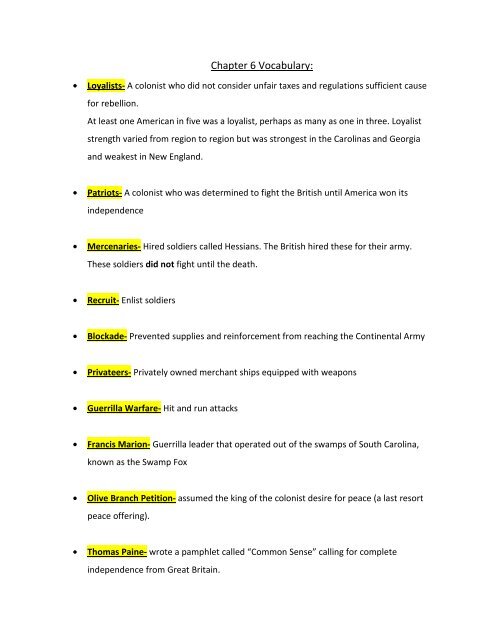Causes and Effects of European Exploration: Causes- Effects-
Causes and Effects of European Exploration: Causes- Effects- Causes and Effects of European Exploration: Causes- Effects-
Chapter 6 Vocabulary:• Loyalists- A colonist who did not consider unfair taxes and regulations sufficient causefor rebellion.At least one American in five was a loyalist, perhaps as many as one in three. Loyaliststrength varied from region to region but was strongest in the Carolinas and Georgiaand weakest in New England.• Patriots- A colonist who was determined to fight the British until America won itsindependence• Mercenaries- Hired soldiers called Hessians. The British hired these for their army.These soldiers did not fight until the death.• Recruit- Enlist soldiers• Blockade- Prevented supplies and reinforcement from reaching the Continental Army• Privateers- Privately owned merchant ships equipped with weapons• Guerrilla Warfare- Hit and run attacks• Francis Marion- Guerrilla leader that operated out of the swamps of South Carolina,known as the Swamp Fox• Olive Branch Petition- assumed the king of the colonist desire for peace (a last resortpeace offering).• Thomas Paine- wrote a pamphlet called “Common Sense” calling for completeindependence from Great Britain.
• General William Howe- British commander who brought 32,000 troops to New York. Hethought the sheer size of his army would convince the Patriots to give up.• Nathan Hale- a patriot spy who was hung. According to tradition, just before his hanginghe said, “I only regret that I have but one life to lose for my country.”• Propaganda- Information designed to influence opinion• Resolution- A formal expression of opinion• Repeal- Cancel• Petition- A formal request• Boycott- To refuse to buy• Militia- A group of civilians trained to fight in emergencies• Revenue- Incoming money• Effigy- A rag figure• Minutemen- Militia volunteers who could be ready to fight at a moment’s notice
- Page 2 and 3: The Middle Passage- The inhuman par
- Page 4 and 5: • Tea Act- The British East India
- Page 7 and 8: • Persecuted- to be treated harsh
- Page 9: Chapter 5 Vocabulary:• Boston Mas
- Page 13 and 14: The Revolutionary War consisted of
- Page 15 and 16: Review:Page 158 (Questions 10-18)10
- Page 17 and 18: Review:Page 188 (Questions 5, 6, 8,
- Page 19 and 20: Guided Reading Activity:The Contine
- Page 21: Economic Development in the Colonie
Chapter 6 Vocabulary:• Loyalists- A colonist who did not consider unfair taxes <strong>and</strong> regulations sufficient causefor rebellion.At least one American in five was a loyalist, perhaps as many as one in three. Loyaliststrength varied from region to region but was strongest in the Carolinas <strong>and</strong> Georgia<strong>and</strong> weakest in New Engl<strong>and</strong>.• Patriots- A colonist who was determined to fight the British until America won itsindependence• Mercenaries- Hired soldiers called Hessians. The British hired these for their army.These soldiers did not fight until the death.• Recruit- Enlist soldiers• Blockade- Prevented supplies <strong>and</strong> reinforcement from reaching the Continental Army• Privateers- Privately owned merchant ships equipped with weapons• Guerrilla Warfare- Hit <strong>and</strong> run attacks• Francis Marion- Guerrilla leader that operated out <strong>of</strong> the swamps <strong>of</strong> South Carolina,known as the Swamp Fox• Olive Branch Petition- assumed the king <strong>of</strong> the colonist desire for peace (a last resortpeace <strong>of</strong>fering).• Thomas Paine- wrote a pamphlet called “Common Sense” calling for completeindependence from Great Britain.



